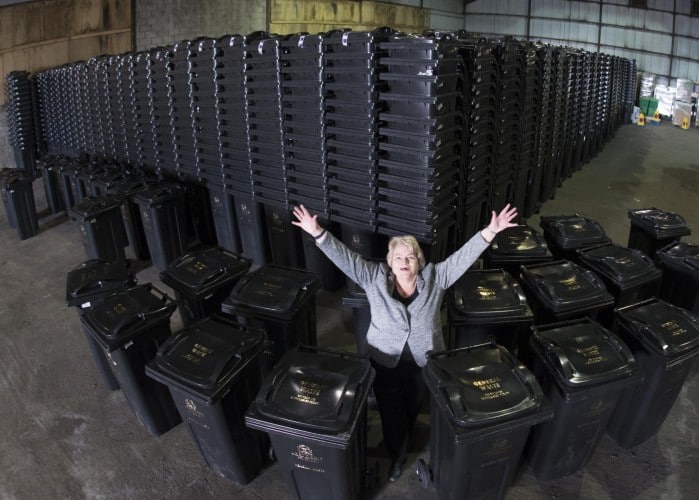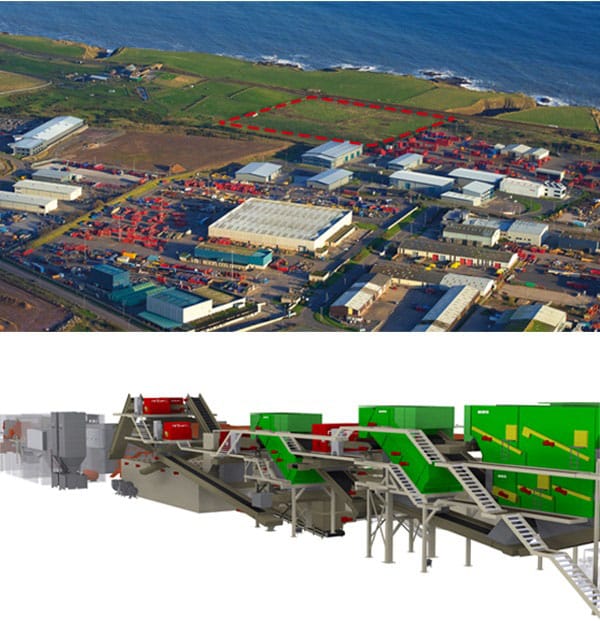Aberdeen city council is preparing for an overhaul of its recycling and waste collection service, which will see a reduction by a quarter in the overall capacity given to residents for residual waste.
The council is delivering close to 70,000 180 litre black wheeled bins to householders – supplied by the container manufacturer MGB – which will replace existing 240 litre containers used for the collection of residual waste.

Cllr Jean Morrison with some of the new MGB bins
Containers currently used for residual waste will instead be used for the collection of commingled recyclable material, which will begin in March.
A sticker will be placed on the 240 litre containers to show that they can take glass bottles and jars; plastic bottles and containers; food and drink cartons; paper, card and cardboard; and metal cans.
This will replace an existing bag and box system which saw paper and cardboard collected separately from glass bottles and jars, plastic bottles and metal. Residual and recyclable waste collections will operate on an alternate weekly collection basis.
Brown bin collections for food and garden waste will continue unchanged.
Suez MRF
Once collected, mixed recycling will be sorted at Aberdeen city’s new materials recovery facility (MRF) in East Tullos – to be operated by Suez from its opening in Spring 2017.
Councillor Jean Morrison, Aberdeen city council’s Zero Waste Management Sub-Committee convener, said: “We’re delivering 70,000 bins over eleven weeks and householders should start using the new calendar from 6 March whether or not they have received their new general waste bin. I would advise residents to check their new calendar carefully and bear in mind that their collection days may have changed.
“It will soon be even easier to recycle in Aberdeen and everyone will have a part to play in helping the Council to deliver an efficient, high-performing service”.
Recycling and RDF
Bulk Handling Systems (BHS) is designing and supplying two materials recovery facilities (MRFs) at Aberdeen city council’s Altens East Industrial Estate south of Aberdeen, Scotland.

Top: The MRF site marked in red before construction and (above) image of the BHS system (Pictures: BHS)
Due to begin operations in April 2017, the Single Stream MRF will process 20 tonnes-per-hour (tph) of commingled recyclables while a system for residual waste (MSW) system is set to process 30 tph to produce refuse-derived fuel (RDF).
BHS says that “the advanced single stream system features a variety of technology to maximise the recovery and purity of recyclable commodities. Included are BHS screens, a Nihot Single Drum Separator and NRT In-Flight Sorting optical sorters. Screen, air and optical technologies will be utilised to break, extract and purify the glass included in the commingled kerbside collection.”
Fibre
NRT technology is to also automate and enhance fibre recovery, with an NRT ColorPlus removing cardboard from news and pams, and a NRT SpydIR removing plastics from the mixed fibre stream.
The system, said BHS, has been designed to comply with the Scottish Government’s Code of Practice on Sampling and Reporting at Materials Recovery Facilities, features sampling, numerous scales to weigh inbound and outbound materials, and automated labeling of outbound bales.
The Single Stream MRF will process 60,000 tonnes-per-year tonnes per annum and recover more than 95 per cent of available recyclables.
The RDF system will process 80,000 tonnes per annum.
Suez is purchasing, operating and maintaining the MRF on behalf of Aberdeen city council. In 2000, the council awarded Suez (then as SITA UK) a contract to manage recycling, composting, treatment and disposal of the household waste for the local authority’s now more than 228,000 residents. The contract was renewed at a value of £200 million in 2010 for 15 years with an option to extend for five years.
Related links
Aberdeen city council
BHS
Suez
The post Aberdeen to reduce waste bin size appeared first on letsrecycle.com.
Source: letsrecycle.com Waste Managment


